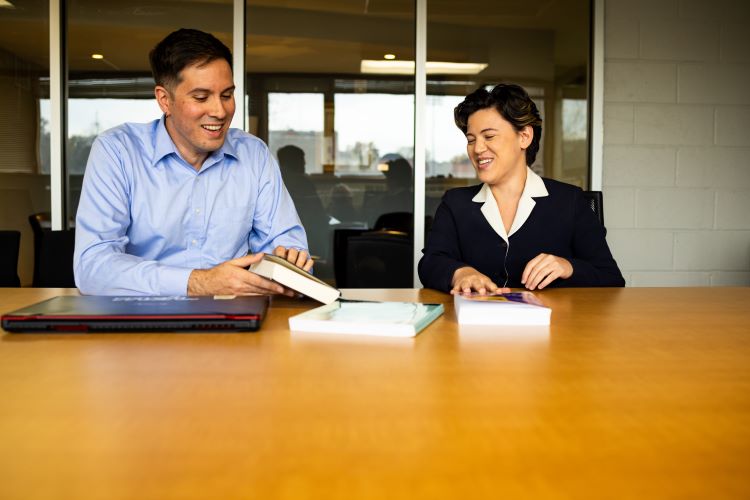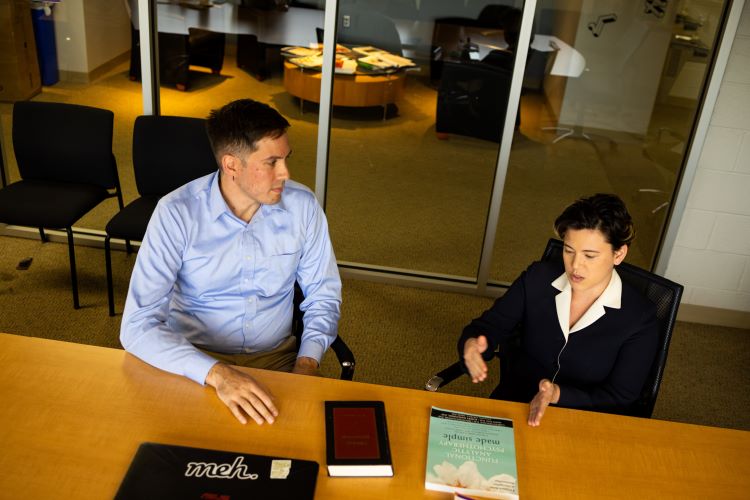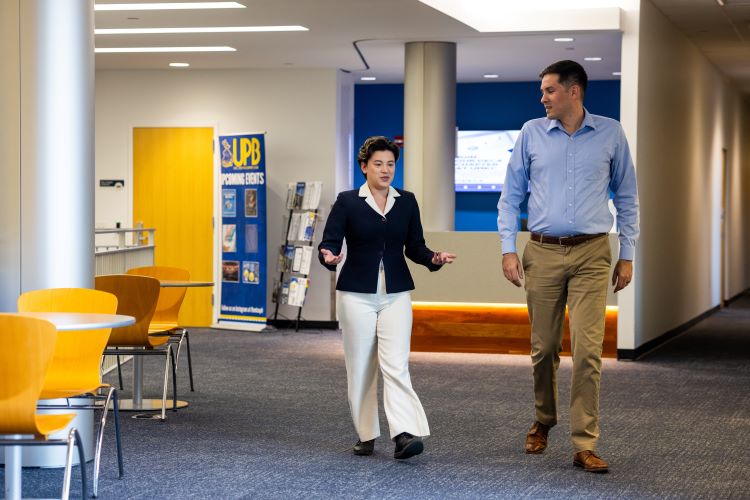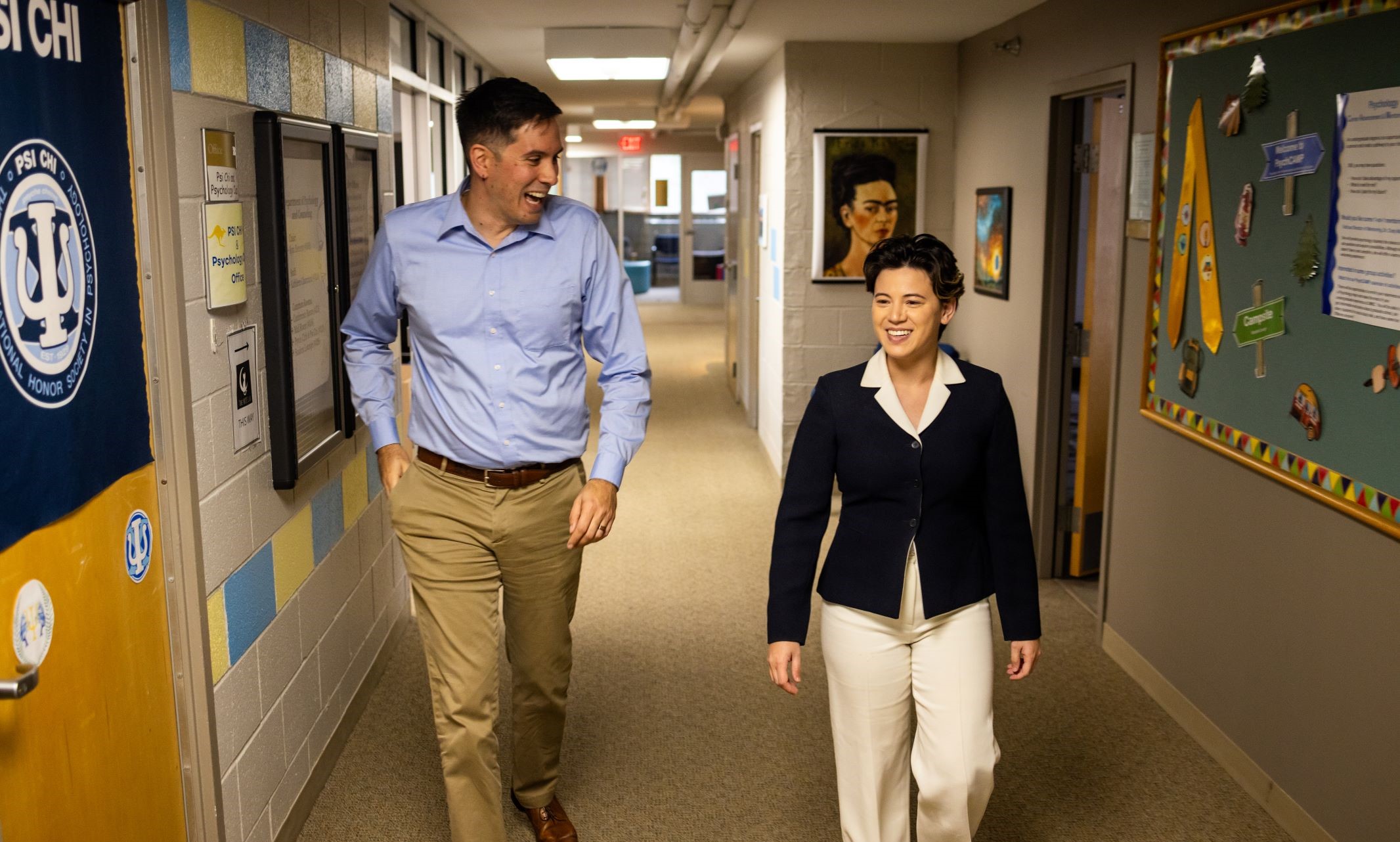The heart of UMKC is our campus community. With lots of opportunities, it’s easy to develop student mentorship teams. And these rich relationships, our Dynamic Duos, are some of our best success stories.
Jennifer Truitt is a second year Ph.D. candidate in psychology. She is currently doing research on her thesis, where she looks at a type of therapy called behavioral activation that is highly efficacious for treating depressive symptoms. Truitt is looking at it as an intervention for LGBTQIA+ young adults who experience loneliness and depression. She is also looking to see if social environment impacts how effective that therapy is.
As Truitt considered different programs, she decided that her direct mentor would be one the most important things to consider.
“When you’re applying to a Ph.D. program, you are typically applying to work with a specific person,” Truitt said. “I joke that the application process for Ph.D.s is if like children had to send out applications to be adopted.”
After doing some research, Truitt reached out to Daniel Maitland, Ph.D., a professor at Bowling Green State University in Ohio at the time, now UMKC associate professor, after learning more about his research. She wanted to see if they would get along as people as well.

“We got along great from the start,” Truitt said. “It was important for me to get a sense of the work he was doing and the speed of his research. I wanted someone who was still early in their career as well. His area of expertise was very close to what my interests were, and he just seemed like a really cool person to work with.”
Maitland’s research is focused on the bi-directional relationship between loneliness and one’s mental and physical health. Maitland originally started as a psychotherapy researcher that specifically looked into a form of therapy that is characterized by an intense therapist-client relationship, where therapists are encouraged to be themselves as much as possible, something uncommon in the field. Essentially, the relationship becomes one of the closest the client has, but it is constrained to the therapy context with the explicit goal of helping the client. He looked into how that relationship predicted therapy outcomes and why those outcomes occurred. His research eventually led him to become interested in the formation and consequences of relationships.
“I think we can create specific types of interactions that foster connection,” Maitland said. “When you look at loneliness research, people tend to just look at the outcome. Are you lonely or not? But they don’t look at how specific behaviors during interactions impact us, and that is really the part that I am interested in.”
Maitland’s research was featured in The New York Times Magazine earlier this year. In the article, they referenced his research in 2021, where he assembled a group of self-identified lonely people to participate in some relationship-building exercises.
Maitland said Truitt had a lot of questions for him when they first met, putting a lot of time and effort into understanding the type of persona and mentor he is.
“It’s actually a funny story,” Maitland said. “My first interaction with Jennifer was when she accidentally sent me an email that was supposed to be for a different researcher she was applying to work with as well. But when we met, I was very impressed with her experiences at this stage in her career and extended an offer for her to work with me. She then spent a long time interviewing me before accepting the offer.”
When the opportunity for Maitland’s wife, Elizabeth Neilson, Ph.D., now assistant professor in the School of Education, Social Work and Psychological Sciences, to get a faculty position at UMKC came, he was also offered a position, which he gladly accepted.
Truitt, being a close mentee to Maitland, decided to come as well. Together they figured out the logistics for their research and her Ph.D. program, and she was able to transfer to UMKC.
“As previously mentioned, when applying to a Ph.D. program, it’s typically so you can work with a very specific person,” Truitt said. “I wouldn’t have moved across the country to work with Daniel the first time if he wasn’t the person I wanted as mentor. He is a wonderful person who is consistent with his values. UMKC also emphasizes working with communities that I am passionate about which made it a lot easier to make that transition.”

Maitland was extremely pleased with her decision.
“I was hoping she would follow me to UMKC,” Maitland said. “So, when she decided to, it was very exciting and rewarding to me as a mentor.”
Maitland is extremely proud of Truitt and how far she has come in her career.
“I am constantly proud of Jennifer," Maitland said. "I am very happy with how far she has come and her constant growth. Not only did she take on a very ambitious research project, but she also got a $25,000 grant, which isn’t common for any first-year graduate student. I can’t wait to grow along with her.”
Truitt was honored as one of the 10 Generation Z changemakers by the Pink with Purpose Project., national initiative presented by the partnership between The Jed Foundation and Victoria’s Secret Pink. It recognizes and supports young individuals pursing projects that strengthen communities and promote positive mental health.
Truitt deeply values her mentorship with Maitland.
“Daniel’s mentorship is tremendously important to me,” Truitt said. “People in mentor roles sometimes don’t know how to deal with people with unpleasant things, and Daniel handles it well. I really value how he treats his students like adults. He is also really good at giving and receiving feedback. I’ve never ended a conversation without him asking if he can help me and I know he genuinely means it.”

Truitt is enjoying her time at UMKC as a transfer student, meeting new friends and getting to see Kansas City. She stated that one of the reasons why she was interested in transferring, besides her mentor, was the potential Carnegie Research 1 or R1 designation UMKC is on track to receive.
“The fact that UMKC is making the push for being R1 made my decision to transfer a lot easier, on top of Daniel’s mentorship,” Truitt said. “I plan to go down the academia route for my career and I knew it would provide me with an environment to do the level of work I am interested in without constantly worrying about funding. There are also just more opportunities at an R1 institution, and I am very excited for the future of research at UMKC.”
Maitland also shares similar sentiments on R1.
“Oh my gosh, UMKC receiving R1 means everything,” he said. “That’s a huge part in why I was excited to join UMKC, besides my wife. It was for the ambition of R1 status. It comes with additional resources and prestige. It allows for you to reach levels of your career you can’t otherwise. It also comes with and understanding of expectations and standards that make a big difference in the scientific community.”

